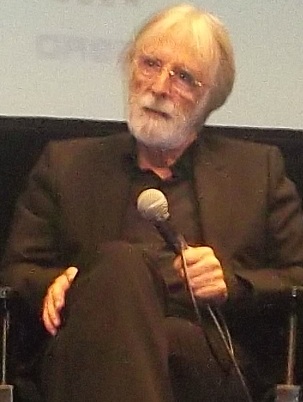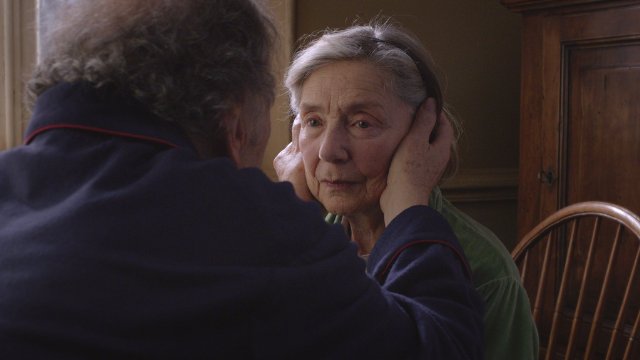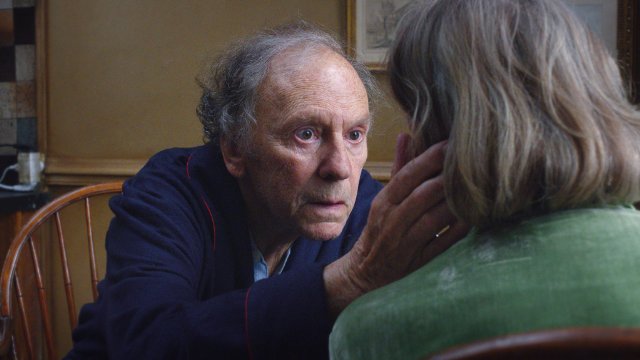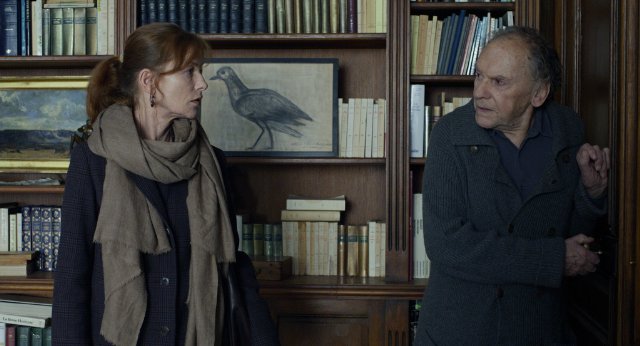A cultivated couple in their 80s, retired music teachers
Georges and Anne have a nice apartment in a fine Parisian
neighborhood. One night, after seeing a former student perform, Anne
blanks out at home, presaging the condition to come. Afterwards,
surgery to correct her blocked artery causes a stroke, which
paralyzes one side. Suddenly her husband has gone from companion to
caretaker. Their daughter, also a musician, lives abroad with her
family, is at a loss and wants her mother to go into managed care.
Instead, Georges takes another course.
Around this scenario, master director Michael Haneke shaped an
artistic, poetic film, Amour, one that has garnered many
award wins and nominations including an Oscar for Best Picture. Ever
since Amour had its American debut at the 2012 New York Film
Festival, Haneke’s film has stirred praise, reaction, commentary,
emotions and angst for its actors, characters, and storyline. What a
great judgment call on the part of NYFF’s programmers.
Obviously for an Austrian director to make a film entirely
in French is an achievement in of itself – something the 70-year-old
Haneke has done before – but to do a film of such elegance and
complexity about a painful and delicate subject makes it worthy of
all accolades. Though Haneke has been nominated for an Oscar before
– as well as having won many other awards – few foreign language
films also get nominations for Best Picture or its actors.
The following Q&A is culled from the press conference
conducted at the NYFF’s press preview screening in October.
 You’ve
said that this film was inspired by events in your own family. What
was it about this subject that appealed to you enough to make such a
poignant film?
You’ve
said that this film was inspired by events in your own family. What
was it about this subject that appealed to you enough to make such a
poignant film?
It was my aunt, I loved her very much, and she was at the
end of her life. At the end of her life she was suffering terribly,
and it was an awful experience for me to have to go through that, to
witness her suffering and not be able to do anything about it. That
was the catalyst for the story, although the story of my aunt has
nothing to do with the story I tell on screen.
As a director, what were the challenges of staging the film
almost entirely in an apartment?
First of all, when you're old and elderly your life is then
reduced to the four walls that you live in. That was the external
reason for the choice. I could have opened the story up, and made a
drama that included everything that goes on around the scenes in the
hospital, everything to make a sort of socially critical film that
you often see on television, but that wasn't my concern. I was
focusing on the love story. There was another consideration for the
aesthetic choice however. When you're dealing with a theme that's as
serious as this one, you have to find a form that's worthy of what
you're dealing with, and that was the reason that I went back to the
three classical unities of Greek drama – time, space and action.
Obviously the casting of the leads was essential. Was there
anything in the script that created concern for stars Jean-Louis
Trintignant or Emmanuelle Riva about taking on these roles? Was
there something too revealing of themselves physically and/or
emotionally?
I wrote the screenplay for Jean-Louis Trintignant. In fact,
I wouldn't have shot the film without him. Not only is he a superb
actor but also he exudes the human warmth necessary for the role. It
was different with Emmanuelle Riva. I'd seen her as a young man in
Hiroshima My Love. I was immediately smitten by her, but had
lost sight of her over the years. So when I came to that part I did
a normal casting in Paris. I met with all the actresses of the
appropriate age. It was clear from the first audition with
Emmanuelle that she was ideal for the part. Not only because she's a
wonderful actress but also because she and Jean-Louis Trintignant
form a very credible couple.
 Emmanuelle
has a particularly revealing scene in the shower. Was she ready for
that? Did you have to lead her there as a director?
Emmanuelle
has a particularly revealing scene in the shower. Was she ready for
that? Did you have to lead her there as a director?
After Emmanuelle had read the screenplay and when I met her
for the first time to discuss the part I asked her if there was
anything she found difficult or that made her nervous and she did
refer to the nudity. I told her that unfortunately the scene was
unavoidable. It was absolutely essential for the film. She said that
she'd shoot it then but that she'd shoot it not as herself – as
Emmanuelle Riva – but rather she would shoot it in the part of Anne.
That made it bearable for her. As a director I did everything I
could to preserve her dignity. But I didn't exaggerate the physical
misery that she was going through.
In various cultures there is a superstition that when birds
enter the house death will occur. You use this in the film. There’s
the image of the bird, the drawing of the bird. In Paris birds come
into the house all the time.
Images like this in my films are an offering that I make to
the audience, inviting the viewers to find their own interpretations
for them. If I were to provide a user's manual, like a commentary to
the film, then I would rob the viewers of the possibility of using
their imagination. That said: it's not that unusual that in Paris
pigeons fly into apartments.
How did you come up with the idea to end the movie with his
decision to stop her from suffering?
How does a melody occur to a composer? It simply occurs to
you. There wasn't any theoretical consideration that led to this. It
was just something that occurred to me.
 It’s
hard to talk about the film because it's so visually and emotionally
strong, but the color of the film, the choices you make, and the
tone, are very important to film.
It’s
hard to talk about the film because it's so visually and emotionally
strong, but the color of the film, the choices you make, and the
tone, are very important to film.
We wanted to tell the story over the period of a year. We
arranged that we set up the light for that reason. It was
complicated because of the fact that there were external shots
through the window with green screen. We shot those sequences, the
externals that you see through the windows, over the period of a
year. It was extremely complicated. The period of post-production
that we accomplished is the accomplishment of Darius Khondji, the
great photographer. It was particularly complicated because usually
you shoot the exterior shots first and then balance your interior
lights to them, whereas we were working the other way around.
Before the movie events, there’s a full life to the two
main characters. Did you discuss with the actors their back-story
and married life before the film’s beginning?
I'm not a fan of long discussions beforehand about the
back-story and about the story of the characters. I think that the
story arises through the set design, through the rooms that the
people are acting in. You don't need long discussions about
back-story if you're working with good actors and if you've made the
right choices for the cast. Here I'm speaking about my work in film
and not in theater. The danger is if you do long discussions about
it then they're going to act their opinions about the parts, their
opinions about the situations rather than acting the situations
themselves.
Throughout the film – particularly near the end – there are
several long single takes with Jean-Louis in particular. Was there a
lot of rehearsal, or were they single takes where they nailed it?
What was the filmmaking process, especially with those scenes?
You can't generalize. There are some scenes that you nail
the first time, others you have to keep going until you get what you
want. The scenes with the pigeon were extremely difficult to shoot.
Pigeons are hard to direct, they don't always go where you want them
to. Since Jean-Louis was so frail, so unsteady on his feet, we shot
the two scenes with pigeons over a period of two and a half days.
Other scenes we only had to do a couple of times. The death scene we
shot a first time, it was very good, we shot it a second take but it
wasn't good so we stopped in the middle. We then did a third take
and at that time we got it right. You can't do scenes like that a
hundred times because it's too hard on the actors.
 Because the actors are at an advanced age they have a
direct proximity to the dire situations they're portraying.
Trintignant was frail and unsteady on his feet for certain scenes.
During the filming was there a thin line between detachment and
self-consciousness in the process of making this picture for these
obviously trained and exceptional performers?
Because the actors are at an advanced age they have a
direct proximity to the dire situations they're portraying.
Trintignant was frail and unsteady on his feet for certain scenes.
During the filming was there a thin line between detachment and
self-consciousness in the process of making this picture for these
obviously trained and exceptional performers?
You'd have to ask the actors that. It's hard for me to
judge. I do remember both of them had read the script; they were
both shocked by what they'd seen. But since they're both
professionals as well they immediately recognized how gratifying it
would be to play these parts. So [they] didn't hesitate in taking
the roles on. As to how difficult it was for them because of what
the scenes meant you'd really have to ask them.
Break-ins seem to be an element you've used in other films.
You have three in the beginning and when he finds the door we never
have the answer as to why the door was pried. And then there’s the
dream sequence. What made you feel this was important to have here
in this film?
I decided to make the ending of the film clear from the
very beginning because I wanted to avoid any false suspense about
where the film was headed. At a certain point in the story that it's
clear where we're going, I wanted to avoid false suspense. My
priority wasn't where the film was going to end but rather how the
characters got there. The beginning when they're coming home from
the concert, I wanted to show that someone had tried to force their
way into the apartment. That preparation was necessary
dramatically. In my family I heard about someone who came back from
vacation to find that their bathroom wasn't working. In itself that
isn't a huge drama, but in this case that led to somebody getting
very upset and in fact to a stroke. Even minor events like that can
have big consequences. I think it's quite often the case in Paris or
here or Vienna that people come home that you find that someone's
tried to break in to your flat. It's just a fact that these sources
of frustration lead you to becoming worked up. At a certain age that
can be dangerous. I also heard someone came up and gave me their
interpretation of that, which was that death had tried to break in
to the apartment. He didn't manage the first time.
Email
us Let us know what you
think.